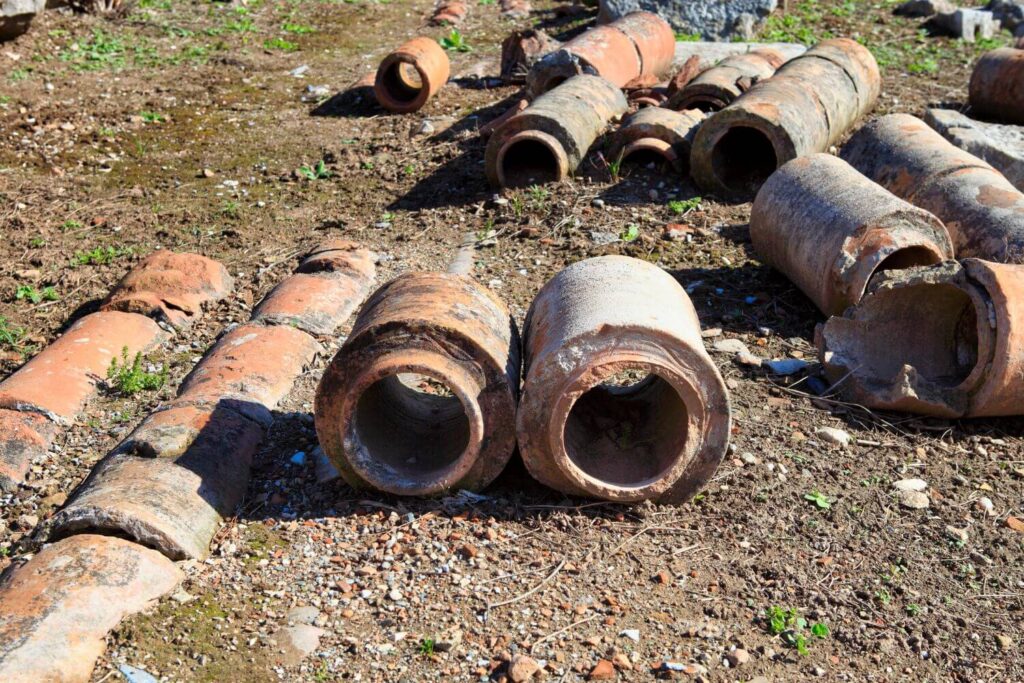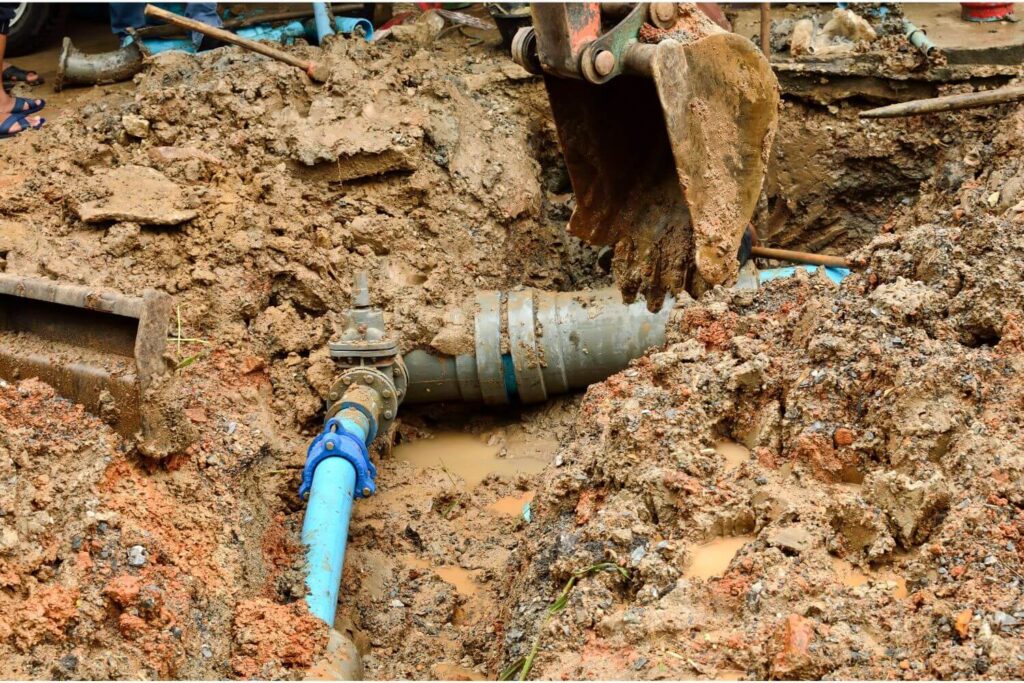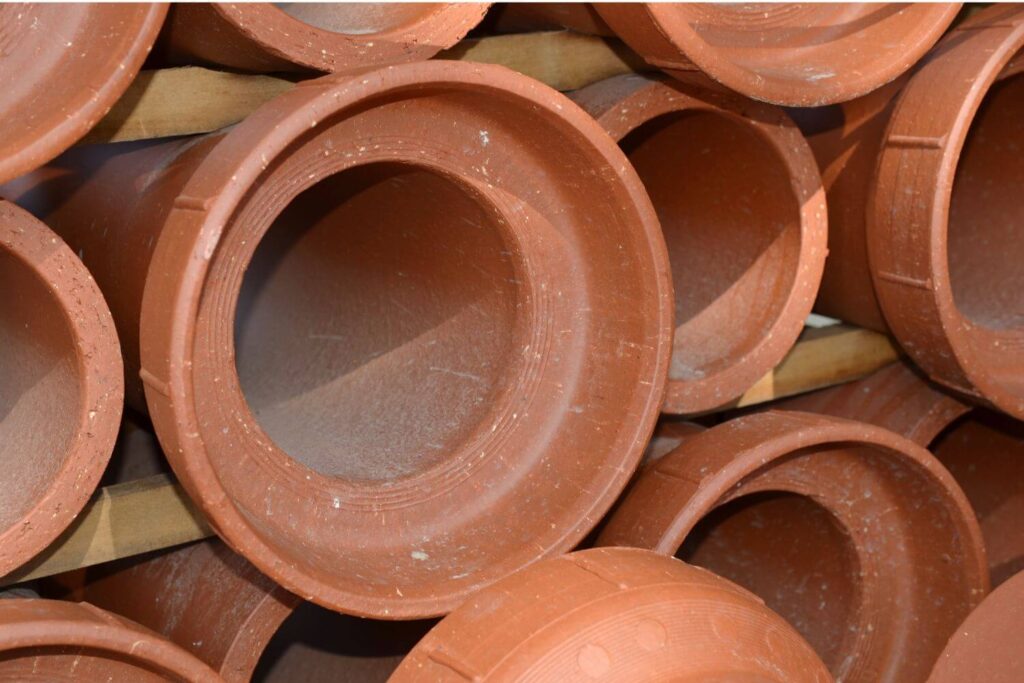Clay pipes have been popular for drainage and sewer plumbing systems for generations, but they can also leave you with a broken sewer line that turns your yard into a soggy, smelly mess. Clay sewer pipes have long been used in and around Western Pennsylvania by both private builders and municipal sewer systems to move water and waste away from your home. Whether your sewer line is stopped up, broken, or needs to be replaced with a more modern alternative, we’re the Pittsburgh sewer line repair contractor your neighbors and community trust to get the job done right.
A Brief History of Clay Pipes
Humans have been using clay pipes since around 4000 B.C. when the ancient Babylonians used clay mixed with fine straw to make plumbing fixtures. Once mixed, the material was formed and baked, creating a hard, waterproof pipe or vessel. Throughout history, clay pipes have remained popular due to the plentiful supply of materials, low cost of production, and the minimal industrialization required to perfect their production. Even with advances in metallurgy and the advent of modern materials, clay pipes remained popular well into the 1990s, and many homes in the Greater Pittsburgh area and beyond still rely on clay pipes for their sewer and drainage needs.
The Benefits of Clay Pipes
While they have largely been replaced by modern materials, clay pipes offer some benefits that can’t be ignored. Many areas of the country still allow their use, especially in restoration projects, and there are still plumbing manufacturers and suppliers who offer clay pipes, fittings, and related materials.
- Clay Pipes Are Environmentally Friendly – Made entirely of organic materials that won’t pollute the environment, these pipes create less long-term waste when their service life is done. Responsible manufacturing practices also keep the environmental impact of their production to a minimum, making these an eco-conscious pipe choice.
- Resistant to Acidic Compounds Found in Waste Water – Some pipe materials are vulnerable to acidic compounds, leading to broken sewer lines. Not clay, which has long been used not only for pipes but also for pickling and food storage. One of the reasons we know so much about ancient clay pipe usage is precisely because they are so durable and long-lasting.
Disadvantages of Clay Sewer Pipes

While they have advantages and a time-tested track record of effective usage, there are several reasons clay pipe sewer line repair keeps us busy. Busted sewer pipes can damage your property’s interior and exterior, including the yard, basement, and structural supports of your home. If you suspect you have a leaking, cracked, or broken clay pipe, you need to act quickly to keep your repair and mediation costs as low as possible.
- Roots Can Infiltrate the Pipe – Clay pipes are prone to intrusion by roots that can force themselves between loose joints, fittings, and through cracks. Once there, they clog the pipe, increasing the pressure building up behind the clog. This can lead to sewage backup, broken sewer lines, and the need for emergency sewer line repairs.
- Clay is More Expensive and Harder to Transport – While the materials are cheap, clay is used less frequently, increasing the cost of replacement clay pipes. These earthen pipes are also extremely heavy, leading to increased shipping and transport costs. They’re also…
- Brittle When Unsupported – If you’ve ever dropped a clay jar or vase, you know what happens when unsupported clay receives too much or uneven force. It cracks and shatters. This further increases transport costs, but it also increases the risk of damage as settling occurs under your yard’s surface, leaving voids that weaken your sewer line. You can also get a broken sewer line if too much weight is placed above or moves over the pipe, such as the new gazebo your spouse is looking forward to or your buddy’s pickup when he helps you move a couch.
- Harder to Work With Than Modern Pipes – Clay’s heavy, brittle nature makes it harder to work with than modern PVC pipes. This includes both replacement and Sewer line repair.
But What About My Clay Sewer Pipes?
If you’re not having issues with your sewer and are just worried about the materials used to make your pipes, you can probably relax some. Clay pipes have proven they can work perfectly for extended periods of time when properly maintained. If you are having sewer line issues or you are planning an excavation anyway as part of a drainage or construction project, sewer line replacement is a good option to consider.
Common Signs You Need Sewer Line Repair
- Consistently Soggy or Smelly Areas of Your Yard
- Clogged or Gurgling Drains Throughout the House
- Unusual Areas Where Plant Growth is Either Unctrollable or Non-Existent
- Sinkholes
However, servicing, repairing, or replacing clay sewer pipes is a job best left to the professionals.
Professional Pittsburgh Sewer Line Repair and Replacement Services

The sooner you get an expert involved, the better it is for your property. We have the equipment and experience to replace or repair broken sewer lines, whether your property has clay or PVC pipes. There’s no cost or obligation to get started. It just takes a phone call.
A sewer line repair specialist will set an appointment to visit your property and inspect your yard, foundation, and home for signs of broken or damaged sewer lines. You’ll get a customized quote addressing any damage that needs to be repaired, remediation to ensure your property is safe and healthy, and professionally waterproofed to avoid leaks and flooding.
Once you’re ready to go, we use our own excavators, American-made parts, and service from our local team that cares about protecting the properties in our community. We show up on time, work to minimize the disruption in your day-to-day life, and get your property back on track fast. If you have a broken sewer line, call for your free Pittsburgh sewer line repair consultation from A.M. Wall Anchor & Waterproofing today.

